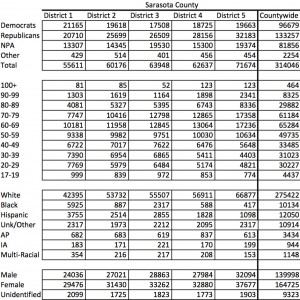The Janus-Faced Nature of Graduation
Guest Correspondence
SRQ DAILY
SATURDAY MAY 13, 2017 |
BY DONAL O'SHEA
For Floridians, May is when the traffic thins and you can show up at a restaurant without a reservation. Extraordinarily massive clouds decorate the late afternoon skies. And at our universities, students graduate: at State College of Florida Manatee-Sarasota on May 5, at University of South Florida Sarasota-Manatee on May 8, at Ringling College on May 11, at Eckerd College on May 21 and at New College on May 26.
Few events in one’s life are as powerful and as portentous as undergraduate graduation ceremonies. Their power derives from the tension that inheres in their Janus-faced nature: they mark an end and a beginning; a culmination and a commencement; a finish and a rebirth. One face looks to the past, marking the graduate’s successful completion of a rite of passage. The other face looks to the future, celebrating the graduate’s transformation.
From the one face, the degree certifies that the graduate has completed a prescribed course of study, as a result of which he or she joins a select group of individuals, be it a guild, a profession or, as Harvard graduation ceremonies traditionally proclaimed, the company of educated men and women. From the other face, the degree signifies that the graduate has emerged transformed.
Both faces inform the graduation ceremony. Academic regalia underscore initiation into a distinguished group. Seating arrangements emphasize transformation. (At orientation events when students first arrive on campus, students and members of their families are greeted as a group and seated together. At graduation, however, the students sit together as a group, with family members sitting behind and at the sides of the group of graduates. The implication is clear: While still surrounded by loved ones, the students have also grown apart from them.)
Some institutions emphasize one face over the other. Liberal arts colleges such as New College or Eckerd, but also the colleges of arts and science that lie at the heart of the nation’s great research universities, tend to favor celebrating transformation. New College graduations, where students wear costumes of their own choosing, unabashedly emphasize the transformational aspect.
To my mind, this is as it should be. Learning consists of forming and strengthening new connections among neurons in the brain. A brain with highly textured, abundant connections differs fundamentally from one without.
At New College, students enter curious. They graduate curious. But the graduates have learned to imagine broader landscapes on which to exercise their curiosity. They have learned to talk and to write about what matters to them, to test assumptions, to ask questions and to evaluate evidence. They have demonstrated that they can act productively on their curiosity and in so doing have acquired confidence in themselves.
Ours is a civilization built on specialization and 80 percent of New College graduates will be in post-graduate studies within a few years. But to judge by past graduates, virtually all will report, decades hence, that their four undergraduate years were the most transformative in their lives. For it is in those years that they acquired the tools—the habits of mind—that taught them not what to think, but how to think and, in so doing, set them free.
This brings us to the center of the two faces of graduation. Good education transforms because it liberates. No one can fully shape life’s circumstances, but freedom allows one to reflect on those circumstances and to decide how one will be, those circumstances notwithstanding.
Freedom undergirds our shared humanity. It does not depend on where we live, and is not a birthright. It can, however, be won in different ways: through a long life well-lived, through a reflective disposition and an enriching environment or through the good fortune of a first-rate education.
Little wonder that graduations are so powerful. They celebrate the transformation that frees the graduate to participate fully in the human experience. The group to which the graduate has been initiated is far more distinguished than a mere guild, or profession or company: it is all mankind.
Donal O'Shea is president of New College of Florida
« View The Saturday May 13, 2017 SRQ Daily Edition
« Back To SRQ Daily Archive








